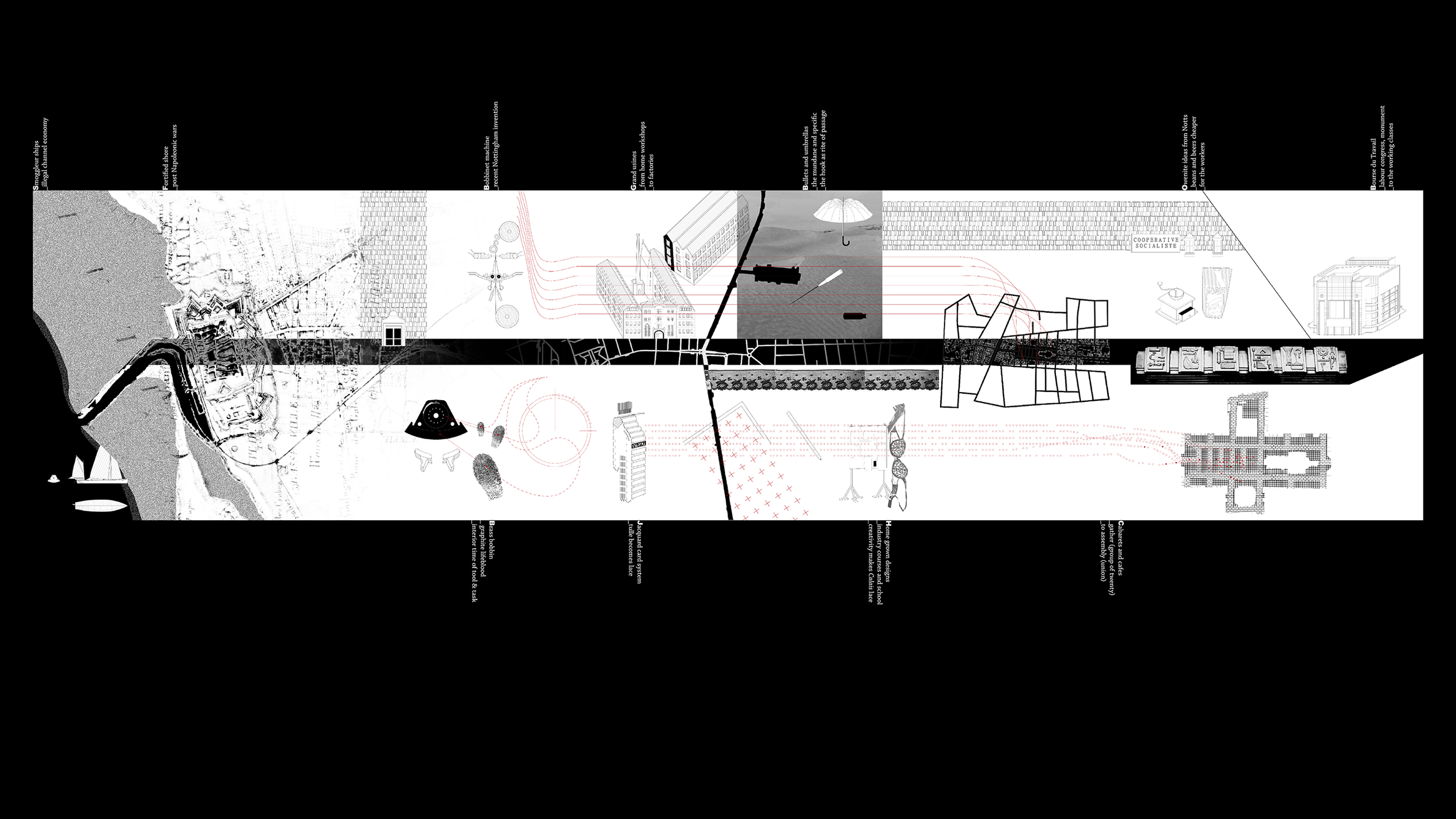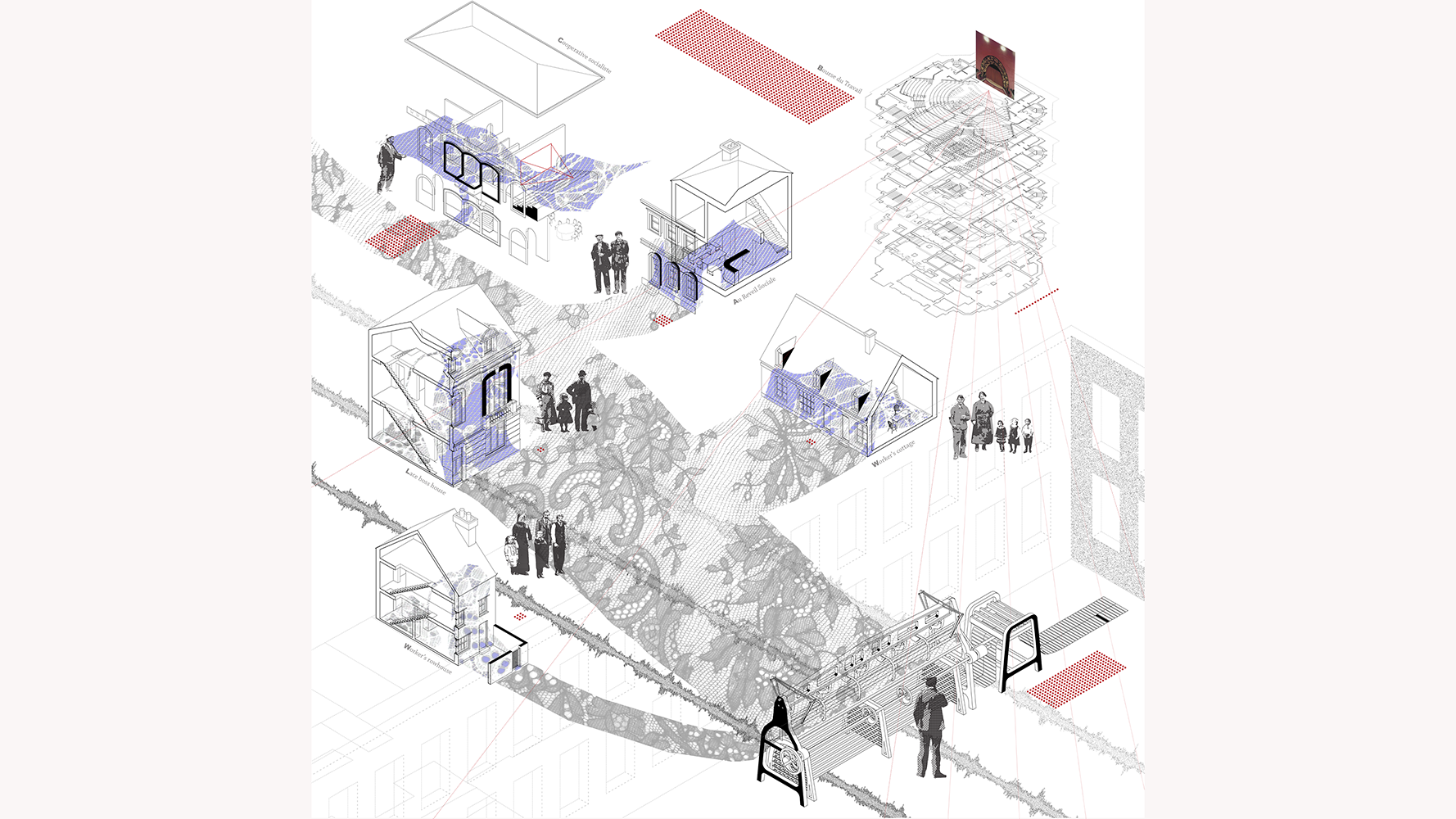
‘The Radical Raccommodeuse’ by Ila Colley
MA Political Architecture: Critical Sustainability (2018-20)
The Royal Danish Academy of Fine Arts, School of Architecture / Copenhagen / Denmark
Key supervisor: Runa Johannessen
Other influential staff at Political Architecture: Niels Grønbæk (Programme Director), Dag Petersson (Associate Professor), Beata Hemer and Daniel Serafimovski.
This project reimagines Calais as a confederation of ‘Repairgrounds,’ buildings that potentialize social change, even system change. This new community is styled after the Raccommodeuses, the repair-women of the city’s once prosperous lace industry. Recent humanitarian crises in Calais coincide with the final decline of this industry. Public life in Calais has stagnated; both Calaisiens and the transient population are motivated towards isolationism in this highly securitised landscape. Repair is an imperative to act, together, to rebuild empathy and solidarity, and empower the people in the politics of their city in crisis.
In the 150 years following the illegal arrival of English workers and their machinery from Nottingham, the city’s social and political cohesion was programmed by lace production via a constellation of ideologies, actions, concerns, relations and inhabitings. This lineage, from its clandestine arrival, its customary transition, and galvanising effect in the industrial-era workers’ struggle, forms a foundation of existing cultural and built landscapes for this new project.
The city was once seen as a machine park, built to house the huge, noisy lace looms. Now dilapidated, the factories were used as shelter by displaced people for some years, sparking a solidarity squatting movement which undertook collaborative maintenance. Most structures have since been blockaded or razed. Several remaining sites are chosen, consisting of empty lace-era houses and factories. The factory is reimagined as a “Repairground” consisting of workshops and classrooms, while the house is reimagined “the Wardrobe” as site of review and outwards communication. Here, the community learns to mend, re-make or reimagine, also to engage in politics of repair: organising, resisting, speculating.
Alongside repair is the concept of cabaret. In Calais, the turn-of-the-century cabarets are remembered from the lace-worker’s struggle as places to meet, laugh, vent, and share ideology and strategy. The Parisian cabarets artistique were vessels for fierce social and political satire across the social strata, renown for provocation and parody. To enter the cabaret was to subject oneself to critique, as well as participate in the critique of others. In the cabaret, dissensus was expressed through dialogue between audience and performer; the show should never be didactic. Three imagined characters are as follows: the Raccommodeuse, who embodies repair and education, which the Cabaretier communicates and discusses, which the Architect responds to and designs from, whose designs are acts of community repair which the Raccommodeuse attends to, and so on.
Architectural disposition and facility help build this community. Both of these buildings are made theatrical to encourage all kinds of voices, enabling face-to-face discussion as well as direct decision-making processes. The tectonic approach is like lace, regarding the existing fabric of the building like the structural mesh of tulle into which the motif is woven. The design becomes a patchwork of moments that intercept the existing, cutting into it or acting as a crutch. Ornament is liberated, mobile and exposed, inciting attentiveness and guardianship. This process of reviewing, dismantling, reorganising or enriching space is itself a collaborative task of repair.
Ila Colley / MA Political Architecture: Critical Sustainability / The Royal Danish Academy / 2018-2020
Baby architect working with the textual and visual. Analysis, lyric, script, and manifesto, alongside investigative drawing, model-work and curation co-evolve as tools to probe social and political conundrums in architecture and urbanism. I’ve studied and worked in Edinburgh, Stockholm and Copenhagen.
labour / repair / solidarity / community-empowerment / cabaret / unionism / social-reproduction / dissensus / dialogue / post-industrial




![5 the Repairground, repair decks [Loom].png](https://images.squarespace-cdn.com/content/v1/5fd0dae1973a10172ea7e02b/dbb81a90-8ab3-4207-9e2a-57dd4c21b43a/5+the+Repairground%2C+repair+decks+%5BLoom%5D.png)


